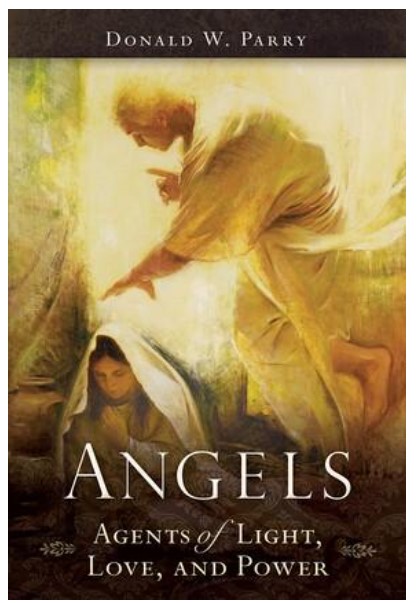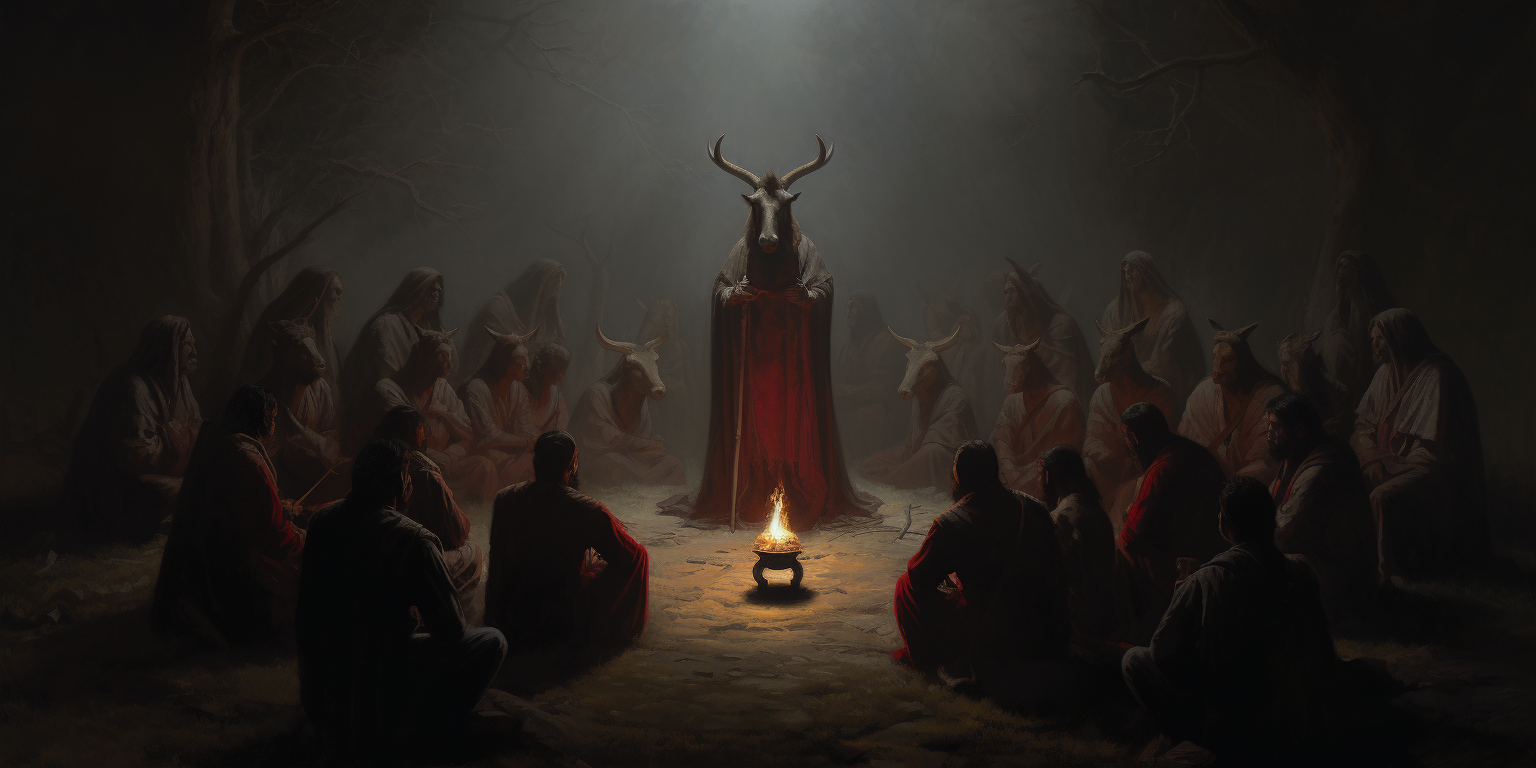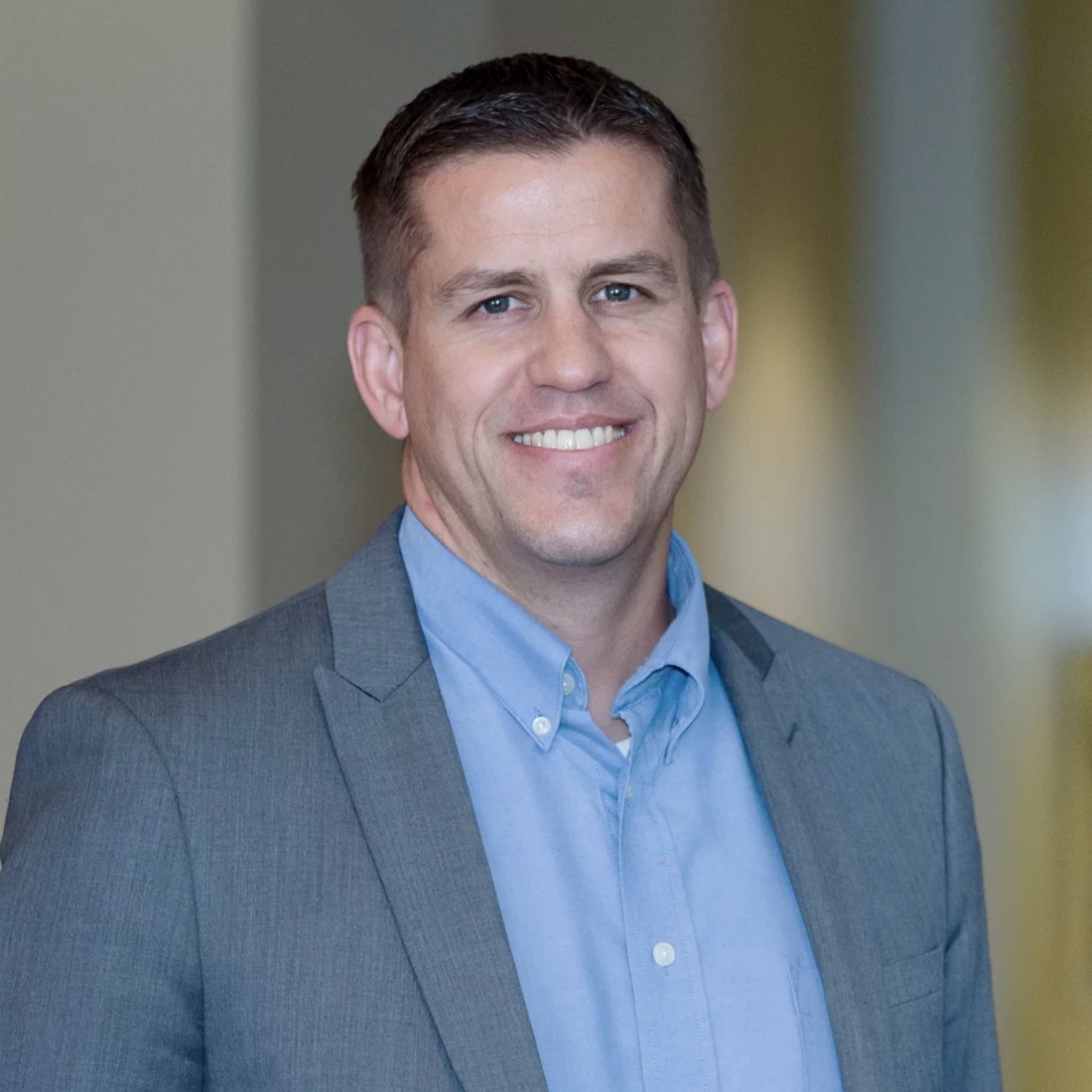Most of us know how it feels. If you don’t yet, you will one day in the future.
The painful separation and death of a loved one. A father or mother. A sibling or spouse. A child. A dear friend or mentor or neighbor or co-worker.
The grief and pain of such distance can be excruciating, palpable, and enduring. Even and sometimes especially during special occasions such as a holiday reprieve, the sorrow can feel acute. In what follows, we share an updated version of something that was given to one of us long ago after the death of one of our own dearest family members.
All over the world—across cultures, traditions, and times—stories have been told about help and comfort received from angels. In our own heartbreaking loss of loved ones, specific beliefs about angels held by Latter-day Saints have brought tangible comfort, consolation, and joy—even though some degree of sorrow naturally continues. We hope these encouraging words will do the same for you this season, decreed by angels to be one of “peace on earth and goodwill” to us all.
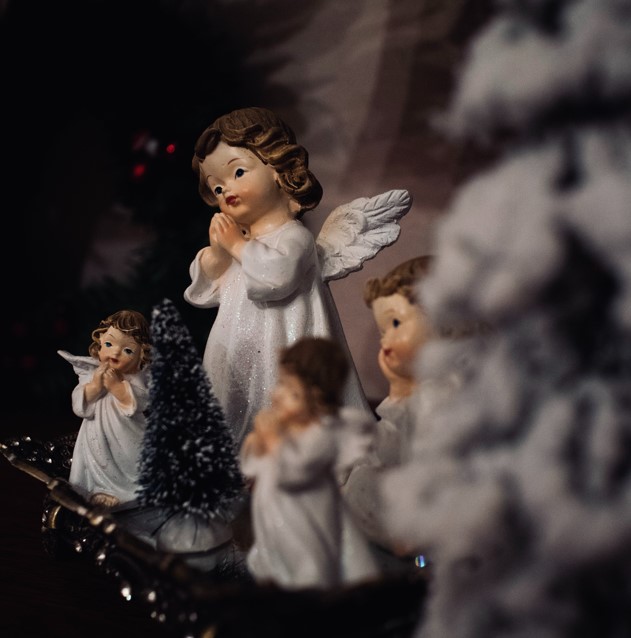
From all of us at Public Square Magazine, may your Christmas be one of surprising sweetness and consolation.
Twelve Comforting Truths
1. You will see them again. At the end of the movie Gladiator, the friend of the story’s deceased protagonist looks up and says, “I will see you again … but not yet. Not yet.”
That’s a nice gesture—and certainly feels better than all of the popular “we can hold their memory in our heart” sentiments. But could it be actually true?
We share our witness that it is. As Joseph Smith wrote in April 1843:
More painful to me are thoughts of annihilation than death; if I had no expectation of seeing my Father, Mother, Brothers, Sisters, and friends again, my heart would burst in a moment, and I should go down to my grave. The expectation of seeing my friends in the morning of the resurrection cheers my soul, and makes me bear up against the evils of life; it is like they’re taking a long journey, and on their return, we meet them with increased joy.
What expectations do you have of life to come? In your quiet moments, consider our reassurance that your loved one’s life has not been extinguished in annihilation. Rather, they dwell in a place of continued learning, growth, and connection, along with all the peace and joy that accompanies that.
2. There is great peace, joy, and love experienced by our departed loved ones. After a loved one passed away, one of us took great interest in careful reviews of hundreds of near-death experiences. Two patterns came up over and over in stories of people who had a real glimpse of death: (1) incredible joy and (2) meeting and seeing others who loved them.
The people who did not report feeling this were individuals who—for whatever reason—had enormous regrets in life and did not feel ready to die. For these people, the glimpse beyond the grave was more painful than joyous. Even so, there is hope for all to be able to continue progressing and growing as they move to the next state. As Alma said:
Now, concerning the state of the soul between death and the resurrection—Behold, it has been made known unto me by an angel, that the spirits of all men, as soon as they are departed from this mortal body, yea, the spirits of all men, whether they be good or evil, are taken home to that God who gave them life.
It’s important to remember the joy, peace, and love are available to us today—and not just to those who die. So, don’t give up on this messy life. Stay with us—and the great adventure to find all that is sweet right here and right now.
3. Those who have passed away are acutely aware of our needs. We sometimes think of the deceased as dwelling in a place far removed from the cares and concerns of our world—preoccupied, as they must be, with ethereal matters and very much not thinking about us anymore.
Yet this simply isn’t the case. The Prophet Joseph Smith taught that after death the “spirits of the just” are “enveloped in flaming fire; they are not far from us and know and understand our thoughts and feelings and notions and are often pained therewith.”
After experiencing the passing of his own dear family members, President Joseph F. Smith spoke in 1916 of the nearness of the world of spirits and of their interest and concern for us, stating, “they are as deeply interested in our welfare today, if not with greater capacity, with far more interest, behind the veil, than they were in the flesh.” President John Taylor similarly reassured, “God lives, and his eyes are over us, and his angels are round and about us, and they are more interested in us than we are in ourselves, ten thousand times, but we do not know it.”
Have you ever felt that love and interest in your life from the unseen world?
4. Angels are able to still be a part of our lives in whatever ways they can. These departed loved ones are doing more than sitting around “thinking about us.” They also want to be a part of our lives—and may participate in our lives more than we realize.
In particular, according to prophetic teaching, they are doing anything and everything they can to help us. Heber C. Kimball once attested that “angels are our associates; they are with us and around about us, and watch over us, and take care of us, and lead us, and guide us, and administer to our wants.” After speaking of angels visiting children during Jesus’s visit to the Americas, President Ezra Taft Benson told some children, “I promise you, dear children, that angels will minister unto you also. You may not see them, but they will be there to help you, and you will feel of their presence.”
Parley P. Pratt taught that angels “eat, drink, sing and converse like other(s). … They pass from one world to another with more ease and in less time than we pass from one city to another. They have not a single attribute which man has not. But their attributes are more matured, or more developed.” B.H. Roberts taught that angels “possess a material body of flesh and bones, can eat, drink, walk, converse, reason, love, fight, wrestle, sing, or play on musical instruments. They can go or come on foreign missions, in heaven, earth, or hell; and they can travel space, and visit the different worlds, with all the ease and alacrity with which God and Christ do the same, being possessed of similar organizations, powers, and attributes in a degree.”
Donald Parry has summarized, “we do not walk alone in mortality because the Lord’s angels frequently visit our sphere of existence, spend time among us, and bless our lives in a variety of ways.” (It’s precisely this “power, to move, to act” that wings represent in visual depictions, by the way).
This sharing of life can include singing with us—something not unsurprising since we’re so familiar with angels singing at the birth of Christ.
“Suddenly a great company of the heavenly host appeared with the angel, praising God and saying, ‘Glory to God in the highest, and on earth peace among those with whom he is pleased!’”
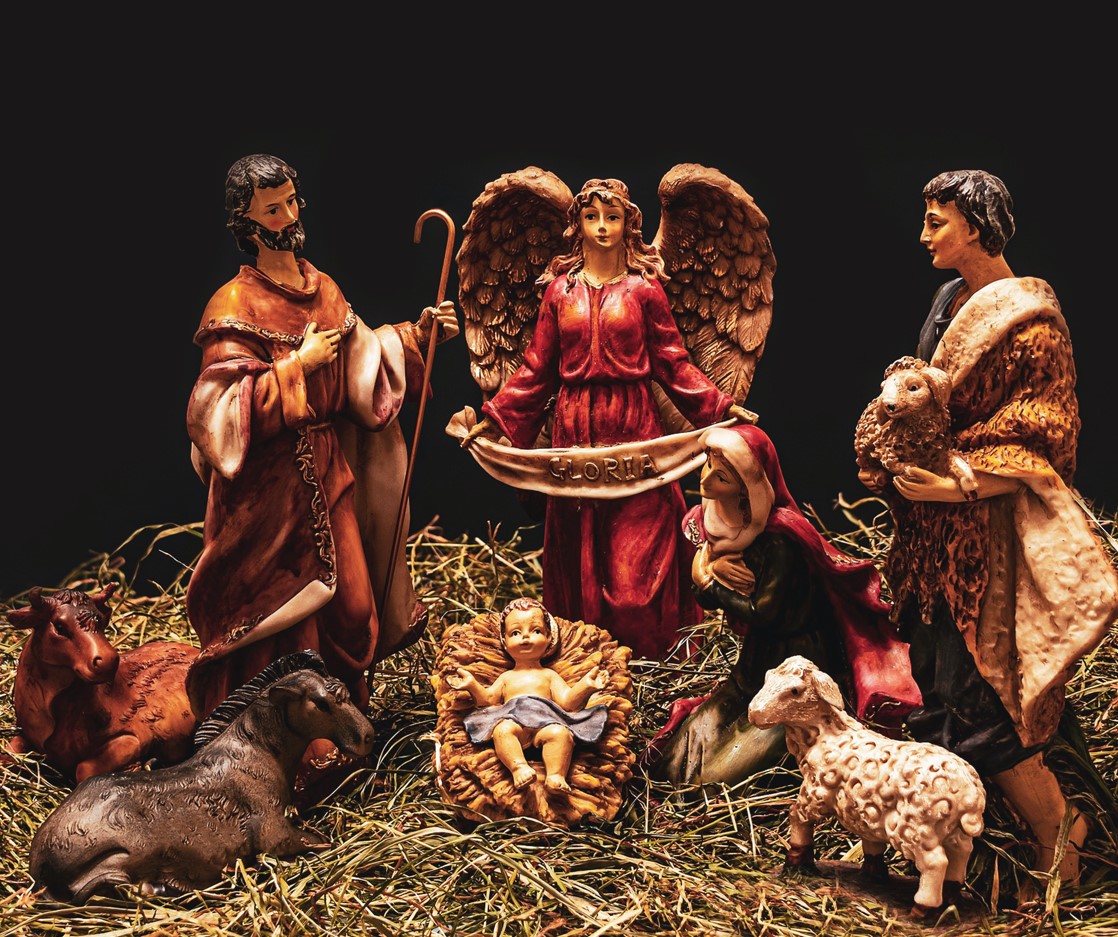
Prescindia Huntington described one of her own sacred experiences in worship with others:
While the congregation was thus praying, we both heard, from one corner of the room above our heads, a choir of angels singing most beautifully. They were invisible to us, but myriads of angelic voices seemed to be united in singing some song of Zion, and their sweet harmony filled the temple of God.
Have you ever heard extra voices joining you in song?
5. Angels have things to teach and share with us. Both the Hebrew (malakh) and Greek origins (angelos) of the English word “angel” mean “messenger.” Alma taught that God “imparteth his word by angels” unto the human family. As heavenly messengers, angels share different kinds of messages with mortals—including words of comfort, love, warning, and encouragement. These angelic messages may be spoken or unspoken—and sometimes simply felt. And they may come in other ways too.
President John Taylor once described “the action of the angels, or messengers of God, upon our minds, so that the heart can conceive … revelations from the eternal world.” President Dallin H. Oaks likewise taught, “The ministering of angels is one of the manifestations of the Spirit. But the ministering of angels can also be unseen. Angelic messages can be delivered by a voice or merely by thoughts or feelings communicated to the mind.”
Although messages can share personalized notes, it’s not any message that angels share—but in line with God’s own heart. As Nephi taught, “Angels speak by the power of the Holy Ghost; wherefore, they speak the words of Christ.”
Does that sound like something you’d like to hear and feel? President Harold B. Lee taught, “When we begin to understand that beyond sight … the spirit world is right here round about us, and if our spiritual eyes could be open, we could see others visiting with us, directing us. And if we will learn not to be so sophisticated that we rule out that possibility of impressions from those who are beyond sight, then we too may have a dream that may direct us as a revelation.”
6. The message angels most often want to share is one of love and consolation. So, what is the greatest word and revelation they wish to share? Elder Jeffrey R. Holland answered:
From the beginning down through the dispensations, God has used angels as His emissaries in conveying love and concern for His children. …Usually, such beings are not seen. Sometimes they are. But seen or unseen, they are always near. Sometimes their assignments are very grand and have significance for the whole world. Sometimes the messages are more private. Occasionally the angelic purpose is to warn. But most often, it is to comfort, to provide some form of merciful attention, guidance in difficult times.
He added, “I testify that angels are still sent to help us.” President George Q. Cannon taught reassuringly:
There is not one of us but what God’s love has been expended upon. There is not one of us that He has not cared for and caressed. There is not one of us that He has not desired to save, and that He has not devised means to save. There is not one of us that He has not given His angels charge concerning. We may be insignificant … in our own eyes, and in the eyes of others, but the truth remains that we are the children of God, and that He has actually given His angels—invisible beings of power and might—charge concerning us, and they watch over us and have us in their keeping.
Candace Berrett pointed out that “those to whom the angels appeared were also waiting for something. They, or perhaps someone they loved, were waiting for temporal things, such as for freedom from the rule of the Philistines, for deliverance from prison, for the defeat of oppressors, for relief from mistreatment by friends, for protection or aid of others, for emotional and physical sustenance, for direction, for healing, for children, and more.”
She added that sometimes angels brought unique deliverance. But more often, the waiting did not end—instead, comfort and consolation were provided. As one hymn states, “To comfort and to bless, to find a balm for woe, to tend the lone and fatherless is angel’s work below.”
President Thomas Monson said to the women of the Church, “Remember that you do not walk alone. The Lord has promised you: ‘I will go before your face. I will be on your right hand and on your left, and my Spirit shall be in your hearts, and mine angels round about you, to bear you up.’” About this same text, President Russell Nelson has said, “What a promise!… remember, God’s holy angels are ever on call to help us.”
7. It’s our own deceased family members who are most likely to be ministering angels. When most of us think of angels, we imagine Gabriel, Michael, Raphael, and other icons of scripture. Yet Joseph F. Smith explained, “When messengers are sent to minister to the inhabitants of this earth, they are not strangers, but from the ranks of our kindred, friends, and fellow-beings and fellow-servants.”
Brigham Young taught that “Angels are those beings who have been on an earth like this, and have passed through the same ordeals that we are now passing through.” And the Lord has confirmed that “there are no angels who minister to this earth but those who do belong or have belonged to it.”
President James E. Faust suggested, “We do not consciously realize the extent to which ministering angels affect our lives,” before quoting President Joseph F. Smith, who said:
Our fathers and mothers, brothers, sisters and friends who have passed away from this earth, having been faithful and worthy to enjoy these rights and privileges, may have a mission given them to visit their relatives and friends upon the earth again, bringing from the divine Presence messages of love, of warning, or reproof and instruction, to those whom they had learned to love in the flesh.
He added, “Many of us feel that we have had this experience. Their ministry has been and is an important part of the gospel.”
8. There are lots (and lots) of angels active around us. In some of our favorite Christmas movies, like It’s a Wonderful Life or The Bishop’s Wife, there is a solitary angel at work in someone’s life. These angels are typically portrayed as unique—a relative anomaly—and their work is singular and exceptional.
Prophetic teaching confirms something very different—that angels are all around us—and operating in people’s lives all the time. “The God whom I serve,” said President Heber C. Kimball, is “one who has millions of angels at His command.” He then asked the group he was speaking with, “Do you suppose that there are any angels here today? I would not wonder if there were ten times more angels here than people. We do not see them, but they are here watching us and are anxious for our salvation.”
This is no doubt especially true among those in the greatest need. Elder Kent Richards told the story of a 14-hour surgery on one young girl. For nearly an hour, as she recovered, this girl described the many visitors who were coming into her room, “Aunt Cheryl is here … and … Grandpa Norman … and Grandma Brown … are here.” She later told her father, “Daddy, all of the children here in the intensive care unit have angels helping them.”
Rather than exceptional, could it be that it’s more normal than not to have lots of angels around us and willing to help? President Brigham Young taught exactly this, “There is much in my presence besides those who sit here, if we had eyes to see the heavenly beings that are in our presence.” Elder Jeffrey Holland once similarly said, “There are angels everywhere at work in the Kingdom.”
It’s unsurprising that we don’t appreciate this since we cannot see them tangibly or easily with our own eyes. That’s why reminders can be so helpful, such as one sweet hymn attests, “Oh, know you not that angels are near you.”
We are “not alone,” Elder John A. Widtsoe affirmed, teaching that men and women walk “in the midst of such heavenly company, from whom we may expect help if we seek it.” Elder Orson Pratt added, “There is no doubt … that heavenly messengers hover around the congregation of the Saints here assembled … to bluff off the powers of darkness, that seek to darken the minds of the people, and to close their hearts against understanding.”
These interactions don’t have to be infrequent. Nephi said, “by day have I waxed bold in mighty prayer before him; yea, my voice have I sent up on high; and angels came down and ministered unto me.” And about his later namesake, Nephi, it is written, “so great was his faith in the Lord Jesus Christ that angels did minister unto him daily.”
The Prophet Joseph said … “If you live up to your privileges, the angels cannot be restrained from being your associates.”
Okay, so what if we aren’t living all we were meant to be? Are angels only sent to those who are in a good place of life?
Not at all.
9. Angels have the unique power to help us when we are really stuck. In addition to whatever other support they may need, Elder Jeffrey Holland encouraged people grappling with addiction to “ask for angels to help you.” As part of finding freedom from addictive patterns, President Boyd Packer said, “Angels will coach you, and priesthood leaders will guide you through those difficult times.”
The night before he was scheduled to be executed, an angel entered Peter’s prison and caused Peter’s chains to fall ”from his hands.” In a perilous moment, Abraham likewise described how an “angel of his presence stood by me and immediately unloosed my bands.”
Angels have a unique power, including over the elements. Elder John A. Widtsoe explained that angels have power “vastly superior to man, knowing well the laws of nature and therefore able to control them.” In the story of King Hezekiah in 2 Chronicles 32, all it took was one angel to help the King overcome an invading force on his people.
Soon after the end of World War II, Harold B. Lee taught, “If your problems be too great for human intelligence or too much for human strength, you too, if you are faithful and appeal rightly unto the source of divine power, might have standing by you in your hour of peril or great need an angel of God.”
10. Angels carry power delegated by God—to whom they report. Amidst America’s ongoing love affair with autonomy, we love to see our superheroes the same way—operating, like Marvel heroes, independently and based largely on their own preferences.
Everything we know about angels confirms much more interdependence and seamless organization—both in what they do and whom they speak with. For instance, President Wilford Woodruff added, “The angels are watching over us. The eyes of all the heavenly hosts are over us. … “angels are watching us and bearing a report of us daily to God.”
In addition to being in communication with God about our needs, angels have powers delegated to minister in our behalf. Brigham Young consistently taught:
The Lord is here with us, not in person, but his angels are ‘round us, and he takes cognizance of every act of the children of men, as individuals and as nations. He is here ready by his agents, the angels, and by the power of his Holy Spirit and Priesthood, which he has restored in these last days, to bring most perfect and absolute deliverance unto all who put their trust in Him when they are ready to receive it.
Elder James Talmage added, “Because of God’s great love, He has set heavenly beings to watch over us and to guard us from the attacks of evil powers while we live on earth. Do we realize that in our daily walk and work we are not alone, but that angels attend us wherever our duty causes us to go?”
11. More than simply emotional comfort, angels can help us in concrete ways. President Harold B. Lee described feeling someone lay his hand upon his head when ill, “I looked up; I could see no one. I know that there are powers divine that reach out when all other help is not available. … Yes, I know that there are such powers.”
Francis Webster famously said of his experience in the Martin handcart company:
I have pulled my handcart when I was so weak and weary from illness and lack of food that I could hardly put one foot ahead of the other. I have looked ahead and seen a patch of sand or a hill slope, and I have said, I can go only that far and there I must give up, for I cannot pull the load through it. … I have gone on to that sand, and when I reached it, the cart began pushing me. I have looked back many times to see who was pushing my cart, but my eyes saw no one. I knew then that the angels of God were there.
Blessing, healing, even lending an arm. There are many stories of people receiving money, food, and other tangible support from angels.
That, of course, was Jesus’ own experience when he was at his darkest moment, “And there appeared an angel unto him from heaven, strengthening him.”
Do you need that kind of strength right now? We’ve been promised that this same kind of support can come to us in our own painful moments.
12. Angels are especially involved in preparing and assisting others at their time of death. Early pioneer Barbara Smith Amussen recounted before her death a visit from her husband in either a dream or vision, “I’m not sure which, but it was so real it seemed that he was right in the room. He said he had come to tell me that my time in mortal life was ending and that on the following Thursday [it was then Friday], I would be expected to leave mortal life.”
As a result, she made concrete plans: On Sunday at church, she bore her testimony and bade the ward members goodbye. During the following days, she withdrew her savings from the bank, ordered her casket from a local mortuary, paid her bills, and even had the power and water turned off at her home. Then she went to the home of her daughter to await her passing. Her last words on Thursday night were, “Mabel, I feel a little bit drowsy. I feel I will go to sleep. Do not disturb me if I sleep until the eventide.”
At the time of his death, Seymour Brunson exclaimed to his family members in 1840, “The room is full of angels. They have come to waft my spirit home.”
Rejoicing with the angels. As we can see all around us today, it’s possible for the human mind to explain away everything—including virtually all tangible evidence of God. But it’s also possible to take seriously those possibilities based on what Paul calls the “substance of things hoped for and the evidence of things not seen.”
In this light, may we count all this collective witness as another reason to smile and look beyond the gloom and despair around us? Moroni taught boldly that angels have not “ceased to appear unto the children of men.” Nor will they, “so long as time shall last, or the earth shall stand, or there shall be one” person “upon the face thereof” needing their help to be rescued.
Elder Jeffrey Holland taught that “one of the profound themes of the Book of Mormon is the role and prevalence and central participation of angels in the gospel story,” before adding, “One of the things that will become more important in our lives the longer we live is the reality of angels, their work and their ministry. I refer here not alone to the angel Moroni but also to those more personal ministering angels who are with us and around us, empowered to help us and who do exactly that.” He concluded joyfully, “I believe we need to speak of and believe in and bear testimony of the ministry of angels more than we sometimes do.”
Saying, “I am grateful for angels,” Elder Holland encouraged people in a 2012 Christmas Message at the Joseph Smith Memorial Building Chapel, “to invite angels into our lives. Angels are our relatives. Angels are prophets. I testify of angels. I believe in angels”:
My beloved brothers and sisters, I testify of angels, both the heavenly and the mortal kind. In doing so, I am testifying that God never leaves us alone, never leaves us unaided in the challenges that we face … always there are those angels who come and go all around us, seen and unseen, known and unknown, mortal and immortal.
You’re never alone. We hope you feel that this Christmas season!
Note: Appreciations to Donald Parry for his book and his adapted texts on LDS Living, “20 Surprising Things We Know About Angels (12/2/19) and “What Prophets and Apostles Have Said About Angels Who Are Around About Us, Leading Us” (6/22/18).
